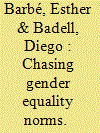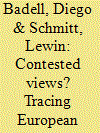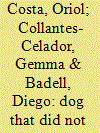|
|
|
Sort Order |
|
|
|
Items / Page
|
|
|
|
|
|
|
| Srl | Item |
| 1 |
ID:
191958


|
|
|
|
|
| Summary/Abstract |
This article studies Sexual and Reproductive Health and Rights (SRHR) at the United Nations (UN). SRHR, a gender equality norm that applies human rights to sexuality and reproduction, have traditionally been supported by a network of actors led by the United States (US) and the European Union. Nevertheless, a rival network has contested SRHR since their conception in the early 1990s. We study the robustness of SRHR in five UN fora between 2009 and 2020, focusing on actor constellations, productive power and norm concordance. Between 2009 and 2016, the normative status quo was maintained, except in the Human Rights Council and the Security Council. In 2017, the US joined the network of rivals and accelerated the norm’s weakening in the Security Council and the Commission on Population and Development. However, to weaken or strengthen the norm further, both networks see a need to address SRHR outside the UN.
|
|
|
|
|
|
|
|
|
|
|
|
|
|
|
|
| 2 |
ID:
184113


|
|
|
|
|
| Summary/Abstract |
The article explores the evolving positions and negotiation strategies of the EU and its member states regarding lethal autonomous weapon systems (LAWS). Specifically, it traces the proceedings around the UN disarmament forum Convention on Certain Conventional Weapons (CCW) from 2013 to 2020. Embedded in the norm contestation literature, the empirical section draws upon semi-structured interviews as well as document analysis. We find that, despite the absence of a CFSP position on the matter, the EU and key member states have been instrumental in shaping the discussions. However, the role of the EU is constrained due to double contestation. First, at the level of member states contestation persists on what is the appropriate regulatory framework (hard or soft law). Second, contestation is also exerted towards the EU by some member states who contest the EEAS’s involvement. Some are conscious that presenting an “EU position” might constrain their ability to build global coalitions. Others do not want the EU to interfere with their national sovereignty on such a critical security issue. While these two elements work against a common EU position, we also observe a window of opportunity for the EU. Notably, the EU can strengthen the CCW by funding the forum structures and secretariat, which could become an important body in the implementation of foreseeable agreements.
|
|
|
|
|
|
|
|
|
|
|
|
|
|
|
|
| 3 |
ID:
180561


|
|
|
|
|
| Summary/Abstract |
The cosmopolitan character of the International Criminal Court (ICC) is not immune to the growing surge in the contestation of international institutions. The African Union’s reaction to the ICC decision to indict the then sitting heads of state of Sudan and Kenya, and the actions undertaken by the Trump Administration against the Court over possible investigations into Afghanistan and Palestine, are cases in point. This article explores what that surge has meant for intra-EU debates on its position towards the ICC. We present a two-fold argument based on an empirical analysis of key moments in the institutional development of the Court that coincide with the pre- and post-rise phases in the politicisation of international institutions. First, the level of agreement on the ICC within the EU has been grossly exaggerated. Second, despite bouts of disagreement, patterns of political conflict over the ICC within the EU remain constant. That is, there is recurrent polarisation, with a range of opinions on the intractable debate about Westphalian sovereignty vs. cosmopolitan justice, but no change in the other two dimensions of politicisation (salience and actor range).
|
|
|
|
|
|
|
|
|
|
|
|
|
|
|
|
|
|
|
|
|